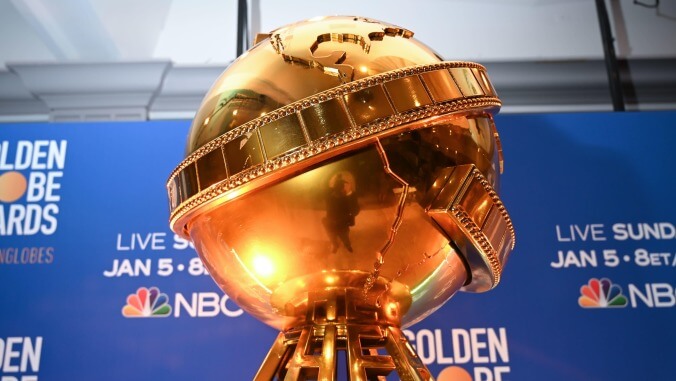Hollywood Foreign Press Association accused of operating like "a cartel"

The Hollywood Foreign Press Association is one of the most mysterious organizations in the entertainment industry, if only because nobody seems to know what the organization even does (if anything) beyond handing out the Golden Globe awards every year, but a new lawsuit filed by a Norwegian journalist named Kjersti Flaa (via The Hollywood Reporter) is trying to shed a rather unflattering light on the “culture of corruption” fostered by the HFPA. Unlike the Academy Of Motion Picture Arts And Sciences (which grows every year), the HFPA consists of only 87 members—many of whom are at least in their 70s—and the lawsuit accuses the organization of establishing rules that are specifically designed to ensure that those 87 people (and only them) continue to get special treatment from movie and TV studios in the form of invitations to exclusive events and opportunities to interview big stars.
Furthermore, the suit says that members are barred from competing against other members, so global markets are divided up among the members and no one is allowed to write for an outlet that another member writes for or an outlet that competes with an outlet that someone else writes for. So let’s say, hypothetically, that you’re an entertainment reporter from Country A. The HFPA already has a member who covers the movie industry for The Country A News, so you can’t join the HFPA if you also write for Country A News or if you write for its competing outlet, The Country A Tribune.
According to the suit, this has given the HFPA the ability to reject potential members—who would like to be given the access and benefits that HFPA members enjoy—based solely on whether or not they could conceivably impact another member’s ability to write about going to fancy events, to interview celebrities, or to (hypothetically) get payola from filmmakers and movie studios who want to bolster their project’s Oscar chances. After all, a Golden Globe win is a big deal, and if you’re the person who gets to choose who wins a Golden Globe, that makes you a big deal.
Variety puts a pretty fine point on this in it’s write-up, referring to what Flaa is describing as “a cartel” based on the way the HFPA is supposedly stifling competition illegally. The allegations in the suit also go further, saying that there’s no clear system in place for rejecting or approving members and that there’s no emphasis whatsoever given to an applicant’s body of work. Instead, their potential membership is supposedly based entirely on whether or not they could be a threat to another member.
On top of all that, the suit points out that the HFPA is listed as a 501(c)(6) non-profit, meaning it’s tax-exempt, despite the fact that—as the suit alleges—it only exists to benefit its current members and not the entire community of foreign entertainment reporters who live in California. Apparently, the HFPA covers all travel expenses for its members, pressures movie studios to provide its members with five-star hotel stays and gourmet meals during events, and pays members to do “little or nothing” in the service of the HFPA. For example, the suit says that the person who arranges the seating chart for the Golden Globes makes $20,000 a year, that there are two members in their 90s who get $12,000 just for sitting on a committee, and that there are former HFPA presidents who get $1,000 a month for doing nothing. No wonder the members supposedly try to hold on to their status as hard as they possibly can.